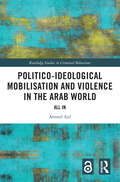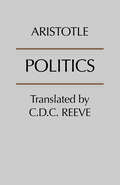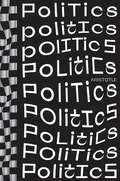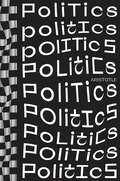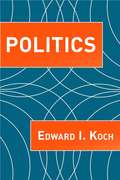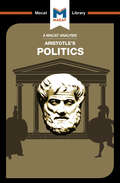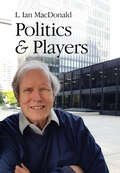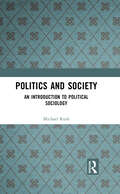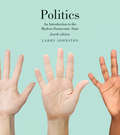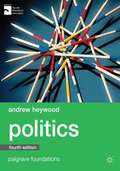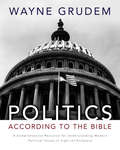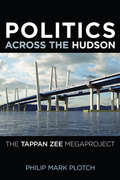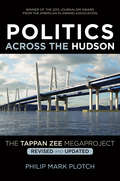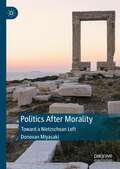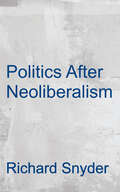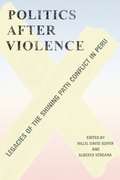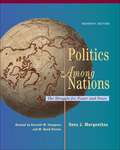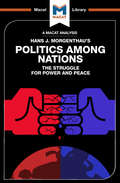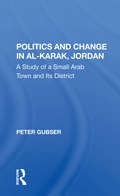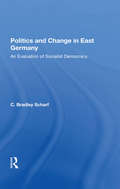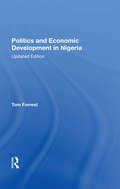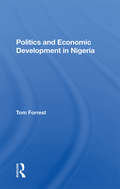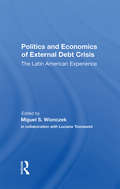- Table View
- List View
Politico-ideological Mobilisation and Violence in the Arab World: All In (Routledge Studies in Criminal Behaviour)
by Ahmed AjilThis book presents a study of politico-ideological mobilisation and violence by focusing on the life stories, trajectories and narratives of individuals who mobilised for causes and conflicts in the Arab World. It provides a greater understanding of the biographical, sociological, political and historic factors pertinent for their radicalisation processes.What makes individuals identify with suffering and injustice, often of others and elsewhere? Why do individuals feel the need to stand up in the first place and how does violent action become a justifiable or necessary course of action? Why and how do they disengage from violence? This book, based on interviews conducted in Lebanon, Switzerland, and Canada, answers these questions. It presents new theoretical insights about politico-ideological mobilisation and violence. By focusing on grievances and grounding analysis in the empirical reality as it is shared and narratively constructed by those who are at the heart of the phenomenon, it moves beyond the moralistic and politicised debates that characterise the field. Interviewees include non-violent and violent engagement for causes and conflicts related to the Arab World, such as sympathisers or members of groups and causes from a variety of ideological orientations, including Shiite militias, Salafi-jihadist groups, radical left-wing groups, Palestine-specific, Kurdish groups, and others such as right-wing or unspecified affiliations. By choosing individuals with different forms of political engagement, both non-violent and violent, and different ideological orientations, it helps readers to get a better grasp of how similar grievances may lead to different outcomes. In focusing on three markedly different geopolitical contexts, the book also provides a crosscontextual understanding of mobilisation for political and violent action. The interviewees also include experts and peripheral actors such as professionals, researchers, policymakers, friends, or family members. Their perspectives complement and enrich some of the findings by providing external yet in-depth ‘expert knowledge’.Politico-ideological Mobilisation and Violence in the Arab World will be of great interest to criminologists, political scientists, sociologists, and other scholars interested in the study of terrorism, radicalisation and extremism. It will also appeal to journalists, policymakers, practitioners working in the field.The Open Access version of this book, available at www.taylorfrancis.com, has been made available under a Creative Commons Attribution-Non Commercial-No Derivatives 4.0 license.
Politics
by Aristotle C. D. ReeveNo other English-language translation comes close to the standard of accuracy and readability set here by Reeve. This volume provides the reader with more of the resources needed to understand Aristotle's argument than any other edition. An introductory essay by Reeve situates Politics in Aristotle's overall thought and offers an engaging critical introduction to its central argument. A detailed glossary, footnotes, bibliography, and indexes provide historical background, analytical assistance with particular passages, and a guide both to Aristotle's philosophy and to scholarship on it.
Politics
by AristotleA timeless study of politics and society by one of the all-time greatest thinkers.A student of Plato, Aristotle is considered a founding father of philosophy and ethics. This reflection on the role of government, and an individual's role within it, remains as prescient and relevant now as when it was written. One of the most influential books in history, Politics has influenced the greatest thinkers of the last 1,000 years and is a crucial book for those interested in evaluating the way our societies are structured.Part of a boldly designed series of classics, with wider margins for notes, this book is perfect for design-lovers and students alike. With bold, eye-catching graphic covers by Evi O Studio, this collection aims to introduce a selection of the most celebrated works of the last thousand years to a new audience. Featuring tales of adventure, fiction from the 19th and 20th centuries, feminist writings, and reflections on art, politics, philosophy and the origins of man, this is a small, wide-reaching and essential collection.'Man is naturally a political animal.'
Politics
by AristotleA timeless study of politics and society by one of the all-time greatest thinkers.A student of Plato, Aristotle is considered a founding father of philosophy and ethics. This reflection on the role of government, and an individual's role within it, remains as prescient and relevant now as when it was written. One of the most influential books in history, Politics has influenced the greatest thinkers of the last 1,000 years and is a crucial book for those interested in evaluating the way our societies are structured.Part of a boldly designed series of classics, with wider margins for notes, this book is perfect for design-lovers and students alike. With bold, eye-catching graphic covers by Evi O Studio, this collection aims to introduce a selection of the most celebrated works of the last thousand years to a new audience. Featuring tales of adventure, fiction from the 19th and 20th centuries, feminist writings, and reflections on art, politics, philosophy and the origins of man, this is a small, wide-reaching and essential collection.'Man is naturally a political animal.'
Politics
by AristotleA timeless study of politics and society by one of the all-time greatest thinkers.A student of Plato, Aristotle is considered a founding father of philosophy and ethics. This reflection on the role of government, and an individual's role within it, remains as prescient and relevant now as when it was written. One of the most influential books in history, Politics has influenced the greatest thinkers of the last 1,000 years and is a crucial book for those interested in evaluating the way our societies are structured.Part of a boldly designed series of classics, with wider margins for notes, this book is perfect for design-lovers and students alike. With bold, eye-catching graphic covers by Evi O Studio, this collection aims to introduce a selection of the most celebrated works of the last thousand years to a new audience. Featuring tales of adventure, fiction from the 19th and 20th centuries, feminist writings, and reflections on art, politics, philosophy and the origins of man, this is a small, wide-reaching and essential collection.'Man is naturally a political animal.'
Politics
by Edward I. Koch William RauchFormer New York mayor Ed Koch explains his views on politics.
Politics
by Edward I. KochPOLITICS is "the science and art of political government." It is also "factional scheming for power and status within a group" and "crafty or unprincipled methods." That's the Webster definition. It is all of that and more...
Politics
by Riley Quinn Katherine BerrisfordAristotle remains one of the most celebrated thinkers of all time in large part thanks to his incisive critical thinking skills. In Politics, which can be considered one of the foundational books of the western political tradition, the focus is on problem-solving, and particularly on the generation and evaluation of alternative possibilities Aristotle’s aim, in Politics, is to determine how best to organize a society. He looks in turn at several different type of organization – kingship, oligarchy and the polity, or rule in the hands of many – and evaluates the arguments for each in turn. But he takes the exercise further than his predecessors had done. Having concluded that rule by the aristocracy would be preferable, since it would mean rule by citizens capable of taking decisions on behalf of the society as a whole, Aristotle subjects his solution to a further checking process, asking productive questions in order to make a sound decision between alternatives. Politics was ground-breaking in its approach. Unlike previous thinkers, Aristotle based all his ideas on a practical assessment of how they would play out in the real world. Ultimately, Aristotle argues, the problem of self-interest means that the adoption of a mixed constitution – one based on carefully considered laws which aims at a balance of power between the people and the elite – is most likely to bring eudaemonia (happiness). It’s a conclusion firmly based on careful evaluation (not least the process of judging the adequacy of arguments) and the product of outstanding problem-solving skills.
Politics & Players
by L. Ian MacDonaldIn the turbulent period from 2018 to 2021, Canada saw a majority government reduced to minority standing, a political dynasty tainted by scandal, a neighbouring nation’s struggle to transfer power, and a paradigm-changing pandemic. Political insider L. Ian MacDonald, recognized for his clear-minded commentary on national and world political issues salient to all Canadians, guided his readers through it all.In this third collection of columns and articles from Policy magazine, the Montreal Gazette, and iPolitics, MacDonald focuses on Prime Minister Justin Trudeau’s uneven leadership at home, the Canada-US relationship with Donald Trump in the White House, and Ottawa’s management of health and economic policy during the COVID-19 pandemic. Chapters on prime ministers past and present, hot-button issues such as pipeline protests and the Canada–United States–Mexico Agreement, and analysis of major elections show these standalone pieces as components of a cohesive body of political commentary.In these last four years, everything happened at high speed. Politics & Players ably navigates the terrain.
Politics & Society: An Introduction to Political Sociology
by Michael RushFirst published in 1992. Routledge is an imprint of Taylor & Francis, an informa company.
Politics (Canadian Edition): An Introduction to the Modern Democratic State, Fourth Edition
by Larry W. JohnstonThe latest edition of Politics offers a comprehensive and comparative approach to the essential components of democratic politics in today's states. The book begins by addressing ways of thinking about politics, community, and society, offering broad outlines of political theory in a historical context. Johnston then provides a comparative framework for understanding basic democratic systems which is drawn upon in subsequent sections on institutions, the political process, and governing. The result is an accessible introduction to contemporary democratic politics that is also deeply theoretical and comparative in scope.The fourth edition has been revised throughout and rewritten with a more focused narrative. The student-friendly design incorporates more visuals and sidebars, as well as chapter objectives and a glossary, in order to make the material easily digestible. In addition, a new companion website provides self-study support for students along with a wealth of materials for instructors to draw from when developing lectures, tutorials, assignments, and exams. See www.johnstonpolitics.com for more information.
Politics (Palgrave Foundations Series)
by Andrew HeywoodThe fully revised and updated fourth edition of this text offers a comprehensive introduction to the study of politics, written from an international perspective. It is designed to be of use to students taking courses in any field of the discipline, as well as general readers with an interest in the subject.
Politics - According to the Bible: A Comprehensive Resource for Understanding Modern Political Issues in Light of Scripture
by Wayne A. GrudemA variety of perspectives exist within the Christian community when it comes to political issues and political involvement. This comprehensive and readable book presents a political philosophy from the perspective that the Gospel pertains to all of life so Christians should be involved in political issues. In brief, this is an analysis of conservative and liberal plans to do good for the nation, evaluated in light of the Bible and common sense. In this ground-breaking book, recognized evangelical Bible professor Wayne Grudem rejects five mistaken views about Christian influence on politics: (1) “compel religion,” (2) “exclude religion,” (3) “all government is demonic,” (4) “do evangel-ism, not politics,” and (5) “do politics, not evangelism.” He proposes a better alternative: (6) “significant Christian influence on government.” Then he explains the Bible’s teachings about the purpose of civil government and the characteristics of good or bad government. Does the Bible support some form of democracy? Should judges and the courts hold the ultimate power in a nation? With respect to specific political issues, Grudem argues that most people’s political views depend on deep-seated assump-tions about several basic moral and even theological questions, such as whether God exists, whether absolute moral stan-dards can be known, whether there is good and evil in each person’s heart, whether people should be accountable for their good and bad choices, whether property should belong to individuals or to society, and whether the purpose of the earth’s resources is to bring benefit to mankind. After addressing these foundational questions, Grudem provides a thoughtful, carefully-reasoned analysis of over fifty specific issues dealing with the protection of life, marriage, the family and children, economic issues and taxation, the environment, national defense, relationships to other nations, freedom of speech and religion, quotas, and special interests. He makes frequent application to the current policies of the Democratic and Republi-can parties in the United States, but the principles discussed here are relevant for any nation.
Politics Across the Hudson
by Philip Mark PlotchThe State of New York is now building one of the world's longest, widest, and most expensive bridges--the new Tappan Zee Bridge--stretching more than three miles across the Hudson River, approximately thirteen miles north of New York City. In Politics Across the Hudson, urban planner Philip Plotch offers a behind-the-scenes look at three decades of contentious planning and politics centered around this bridge. He reveals valuable lessons for those trying to tackle complex public policies while also confirming our worst fears about government dysfunction. Drawing on his extensive experience planning megaprojects, interviews with more than a hundred key figures--including governors, agency heads, engineers, civic advocates, and business leaders--and extraordinary access to internal government records, Plotch tells a compelling story of high-stakes battles between powerful players in the public, private, and civic sectors. He reveals how state officials abandoned viable options, squandered hundreds of millions of dollars, forfeited more than three billion dollars in federal funds, and missed out on important opportunities. Faced with the public's unrealistic expectations, no one could identify a practical solution to a vexing problem, a dilemma that led three governors to study various alternatives rather than disappoint key constituencies. Politics Across the Hudson continues where Robert Caro's The Power Broker left off and illuminates the power struggles involved in building New York's first major new bridge since the Robert Moses era. Plotch describes how one governor, Andrew Cuomo, shrewdly overcame the seemingly insurmountable obstacles of onerous environmental regulations, vehement community opposition, insufficient funding, interagency battles, and overly optimistic expectations.
Politics Across the Hudson: The Tappan Zee Megaproject (Rivergate Regionals Collection)
by Philip Mark PlotchWinner of the 2015 American Planning Association New York Metro Chapter Journalism Award The State of New York is now building one of the world’s longest, widest, and most expensive bridges—the new Tappan Zee Bridge—stretching more than three miles across the Hudson River, approximately thirteen miles north of New York City. In Politics Across the Hudson, urban planner Philip Plotch offers a behind-the-scenes look at three decades of contentious planning and politics centered around this bridge, recently renamed for Governor Mario M. Cuomo, the state's governor from 1983 to 1994. He reveals valuable lessons for those trying to tackle complex public policies while also confirming our worst fears about government dysfunction. Drawing on his extensive experience planning megaprojects, interviews with more than a hundred key figures—including governors, agency heads, engineers, civic advocates, and business leaders—and extraordinary access to internal government records, Plotch tells a compelling story of high-stakes battles between powerful players in the public, private, and civic sectors. He reveals how state officials abandoned viable options, squandered hundreds of millions of dollars, forfeited more than three billion dollars in federal funds, and missed out on important opportunities. Faced with the public’s unrealistic expectations, no one could identify a practical solution to a vexing problem, a dilemma that led three governors to study various alternatives rather than disappoint key constituencies. This revised and updated edition includes a new epilogue and more photographs, and continues where Robert Caro’s The Power Broker left off and illuminates the power struggles involved in building New York’s first major new bridge since the Robert Moses era. Plotch describes how one governor, Andrew Cuomo, shrewdly overcame the seemingly insurmountable obstacles of onerous environmental regulations, vehement community opposition, insufficient funding, interagency battles, and overly optimistic expectations...
Politics After Morality: Toward a Nietzschean Left
by Donovan MiyasakiThis book completes the project, begun in Nietzsche’s Immoralism: Politics as First Philosophy, of critically reconstructing a Nietzschean left politics. Nietzsche's incompatibilist ideal of amor fati requires reconceiving legitimacy as the breeding of a people whose material conditions enable it to affirm its social order. Justice is founded in a future, higher type’s right to exist against present individuals who internalize the contradictions of past societies. In opposition to Nietzsche’s self-undermining aristocratism, this right can only be realized through a universal promotion of the pluralistic unity of the manifold soul, secured by an equally manifold form of democracy. Against the covert aristocratism of liberal proceduralism, authentic democracy produces a true people grounded in shared, concrete happiness, requiring a comprehensive egalitarianism maintained by a permanent socialist state and achievable only through a populist, coalitional politics across identities that radically transforms the material conditions of our shared social life.
Politics After Neoliberalism: Reregulation in Mexico (Cambridge Studies in Comparative Politics)
by Robert H. Bates Richard Snyder Ellen Comisso Peter Lange Joel Migdal Helen MilnerThe shift from state-led to market-oriented, neoliberal economic policies has been one of the most important changes in the developing world during the last two decades. Although much existing research has focused on why countries choose these neoliberal policy reforms and how they implement them, Richard Snyder's study offers an analysis of politics after neoliberalism. The book proposes a framework that explains how neoliberal reforms, rather than unleashing market forces, actually trigger 're-regulation' processes involving strategic interactions between political entrepreneurs and societal groups. Depending on the strengths and strategies of politicians and societal groups, reregulation results in different types of new institutions for market governance with contrasting consequences for economic efficiency and social justice. This framework is used in conjunction with an innovative subnational comparative method to analyze evidence from four Mexican states about the politics of reregulation.
Politics After Violence: Legacies of the Shining Path Conflict in Peru
by Hillel Soifer Alberto VergaraThis collection of original essays by leading international experts on Peruvian politics, society, and institutions explores the political and institutional consequences of Peru’s internal armed conflict in the long 1980s. The essays are grouped into sections that cover the conflict itself in historical, comparative, and theoretical perspectives; its consequences for Peru’s political institutions; its effects on political parties across the ideological spectrum; and its impact on public opinion and civil society. This research provides the first systematic and nuanced investigation of the extent to which recent and contemporary Peruvian politics, civil society, and institutions have been shaped by the country’s 1980s violence.
Politics Among Nations
by David Clinton Kenneth W. Thompson Hans J. MorgenthauHans Morgenthau's classic text established realism as the fundamental way of thinking about international relations. Although it has had its critics, the fact that it continues to be the most long lived text for courses in international relations attests to its enduring value. Someone has said the study of international relations has for half a century been nothing so much as a dialogue between Morgenthau, those who embrace his approach, and those who turn elsewhere for enlightenment. After 50 years, the dialogue between Morgenthau and scholars from around the world continues more or less as in the past something with more intensity even in an "age of terror." The new edition preserves intact Morgenthau's original work while adding a 40 page introduction by the editors who explore its relevance for a new era. What follows the introduction are the perspectives of a dozen statesmen, scholars, and observers each offering insights on Morgenthau's concepts and ideas as they relate to current crises on every continent. They bring up to date the dialogue that began in 1948.
Politics Among Nations
by Ramon Pacheco PardoHans Morgenthau’s Politics Among Nations is a classic of political science, built on the firm foundation of Morgenthau’s watertight reasoning skills. The central aim of reasoning is to construct a logical and persuasive argument that carefully organizes and supports its conclusions – often around a central concept or scheme of argumentation. Morgenthau’s subject was international relations – the way in which the world’s nations interact, and come into conflict or peace – a topic which was of vital importance during the unstable wake of the Second World War. To the complex problem of understanding the ways in which the post-war nations were jostling for power, Morgenthau brought a comprehensive schema: the concept of “realism” – or, in other words, the idea that every nation will act so as to maximise its own interests. From this basis, Morgenthau builds a systematic argument for a pragmatic approach to international relations in which nations seeking consensus should aim for a balance of power, grounding relations between states in understandings of how the interests of individual nations can be maximized. Though seismic shifts in international politics after the Cold War undeniably altered the landscape of international relations, Morgenthau’s dispassionate reasoning about the nature of our world remains influential to this day.
Politics And Change In Al-karak, Jordan: A Study Of A Small Arab Town And Its District
by Peter GubserWhen Politics and Change in AI-Karak, Jordan first appeared in 1985, it was part of a sparse, but growing, literature about intermediate-level politics in the Arab Middle East. A number of works had been written on national politics, focused primarily on the capital and national institutions and figures. A few village studies, which used the discip
Politics And Change In East Germany: An Evaluation Of Socialist Democracy
by C. Bradley Scharf C Bradley ScharfThis text avoids preoccupation with "the German question" and East-West German comparisons, looking at the German Democratic Republic (GDR) in its own right while recognizing that a legacy of German history and political precedent persists in the GDR as much as in the Federal Republic. Dr. Scharf shows how the GDR is subject to the same development
Politics And Economic Development In Nigeria: Updated Edition
by Tom ForrestThis text provides an account of the dynamic interplay between the political and economic forces that have shaped government priorities and strategies in Africa's most populous country. The author examines efforts to build a stronger federal centre, to develop national policies, to counter uneven development, and to reduce conflicts that have arisen from ethnic, regional, class and religious differences. A final section analyzes the evolution of economic policy and performance, looking specifically at agrarian policy, the programme of economic liberalization, and the impact of oil revenues.
Politics And Economic Development In: Updated Edition
by Tom ForrestSince the end of civil war in 1970, Nigeria has struggled to build a stronger federal center and to reduce conflicts that have arisen from uneven development and from ethnic, regional, class and religious differences. This book provides a comprehensive account of the dynamic interplay between the political and economic forces that have shaped gover
Politics And Economics Of External Debt Crisis: The Latin American Experience
by Miguel S. Wionczek Luciano TomassiniSince 1981 Latin America has been in the midst of a protracted external debt crisis due, among other reasons, to emergency borrowing at record-high real interest rates and the decline in the region's export proceeds. Until now, most literature on the subject originated in industrial lender countries, whose primary concern is the impact of the debt
